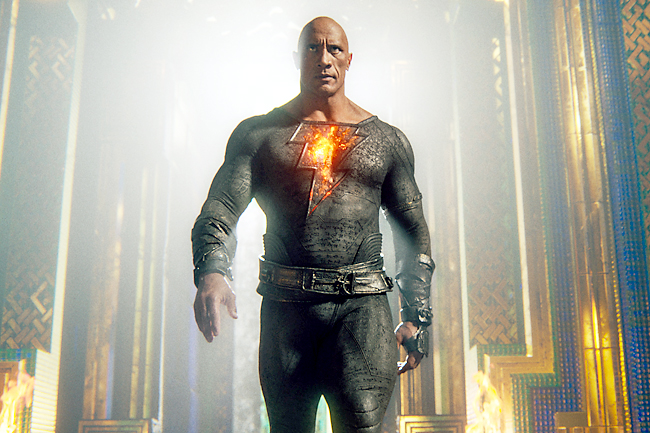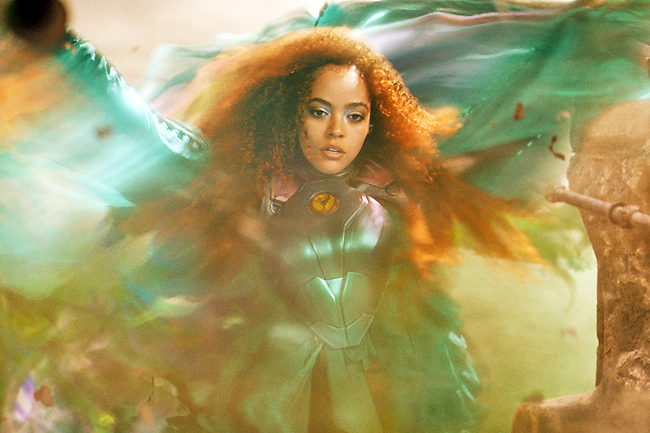Mark Kennedy
AP – Not long into Black Adam, a preteen boy looks up at the muscled hulk of Dwayne Johnson and begs for his help, “We could use a superhero right now.” Speak for yourself, kid.
Do we need another superhero with another convoluted origin story that stretches back thousands of years and fulfills a whacko destiny? Do we really need another clutch of secondary level heroes to muddy focus? We’re almost 40 deep into the Marvel Cinematic Universe and a dozen in the DC universe. You can almost smell the fumes now, can’t you?
Black Adam isn’t bad, it’s just predictable and colour-by-numbers, stealing from other films like an intellectual property super-villain. But Johnson is a natural in the title role, mixing might with humour and able to deliver those necessary wooden lines. Why he hasn’t had a starring role in a DC or Marvel superhero flick until now is astonishing – c’mon, he’s built himself into a superhero in street clothes already.
Like Marvel’s Eternals, Black Adam gets out of the blocks very sluggishly with the tangled tale of our setting – Kahndaq, a fictional Middle Eastern kingdom in 2,600 BC that has wizards, a blood-thirsty king, a magical crown and Eternium, a rare metallic ore with energy-manipulating properties. Flash-forward to present day, where Kahndaq is under the cruel rule of the organised crime syndicate Intergang and its citizens are ripe to rebel.
They think they may have a leader in Black Adam (here Teth Adam, when he is introduced), who is released from his 5,000-year-long tomb and is naturally cranky. Is he a force for good or bad? The answer is yes to all. Yet the other superheroes in the DC pantheon aren’t sure about the new guy and send what can only be described as the Plan B of muscle from leftover members of a knock-off organisation called the Justice Society of America. There’s Doctor Fate (Pierce Brosnan), Atom Smasher (Noah Centineo), Aldis Hodge as a one-note Hawkman and Quintessa Swindell as Cyclone, who can control the wind.


They apparently left at home the superhero with the ability to open jars. Black Adam is more than a match for all of them combined. He can fly, move as fast as The Flash, catch rockets, deflect bullets and harness his own bluish electricity. Mostly he does this weirdly passive thing of just floating. “I kneel before no one” he intones, which might explain it.
Director Jaume Collet-Serra and the design team do a great job in every department but are let down by a derivative and baggy screenplay by Adam Sztykiel, Rory Haines and Sohrab Noshirvani that goes from one violent to another like a video game to paper over a plot both undercooked and overcooked. At one point, with the audience exhausted by all the carnage, they introduce skeletons who rise up as a legion, just what we wanted.
They nicely include pockets of humour that DC has not always done well – a recurring bit with Baby Come Back and teaching Black Adam satire are fun; a Clint Eastwood gag fails – and there may have been three natural endings piling up before the final, manipulative one. (“This can only end one way,” said the script. Don’t believe it).
Amidst the punching superheroes are two humans – a rebel leader and her skateboard-and-comics-loving pre-teen son, played superbly by Sarah Shahi and Bodhi Sabongui, respectively. Comedian Mohammed Amer is a much-needed bolt of bright humour. Most intriguing – and the angle most fruitful to lean into – is the notion of hero itself. The Justice Society members are shocked to find that they aren’t seen as heroic to the residents of Kahndaq, living 27 years under oppression.
Black Adam has come to help, even if he’s a little more violent. Residents wonder where were the guys with all the superpowers for almost three decades while they suffered – a nice dig at Western nations.
“There are only heroes and villains. Heroes don’t kill people,” a confused Hawkman states. Black Adam replies, “Well, I do.” It is Shahiby’s character who notes that it’s easy to call someone a hero when you’re the one drawing the line.
The number of – ahem – call-backs to other films is pretty sad.
It’s a film that is sometimes self-aware, as when the kid urges Black Adam to come up with a catchphrase that will sell lunchboxes.
He does, but it makes little sense, “Tell them, ‘The man in black sent you’.” Wait, he was sent by someone else? Do they mean Johnny Cash? Actually that may be a clue.
What the filmmakers probably had in mind was cash – selling those lunchboxes.





